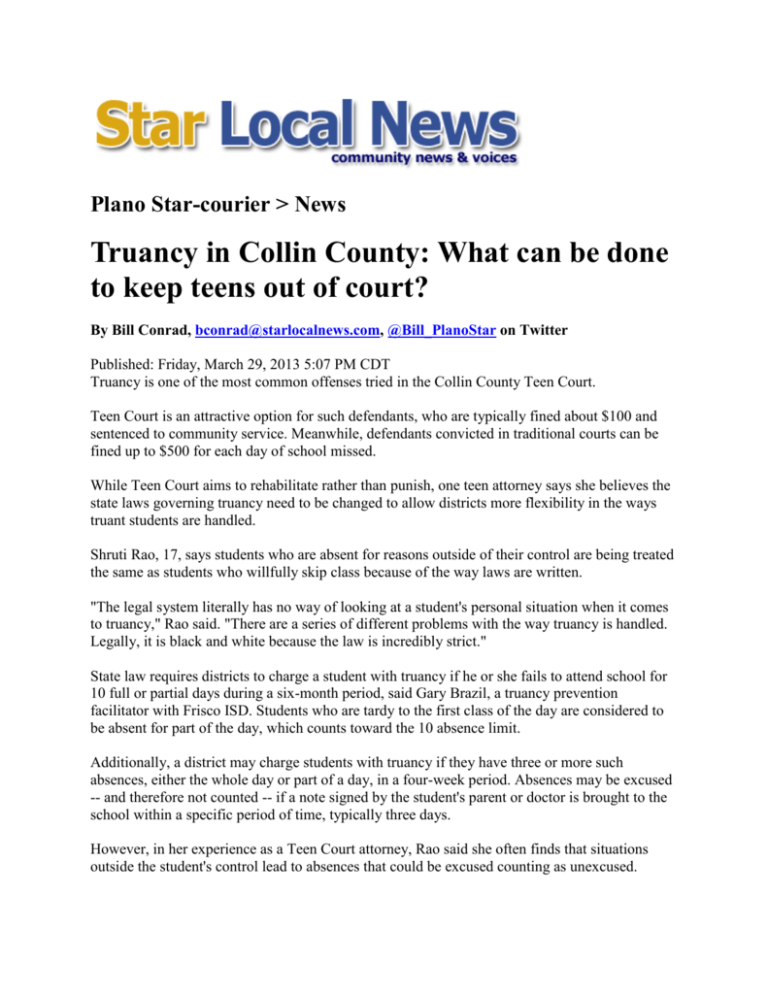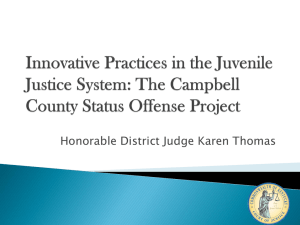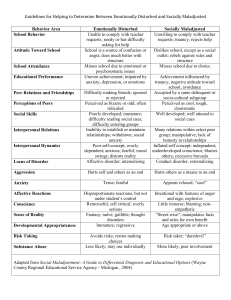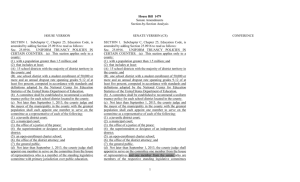Plano Star-courier > News Truancy in Collin County: What can be
advertisement

Plano Star-courier > News Truancy in Collin County: What can be done to keep teens out of court? By Bill Conrad, bconrad@starlocalnews.com, @Bill_PlanoStar on Twitter Published: Friday, March 29, 2013 5:07 PM CDT Truancy is one of the most common offenses tried in the Collin County Teen Court. Teen Court is an attractive option for such defendants, who are typically fined about $100 and sentenced to community service. Meanwhile, defendants convicted in traditional courts can be fined up to $500 for each day of school missed. While Teen Court aims to rehabilitate rather than punish, one teen attorney says she believes the state laws governing truancy need to be changed to allow districts more flexibility in the ways truant students are handled. Shruti Rao, 17, says students who are absent for reasons outside of their control are being treated the same as students who willfully skip class because of the way laws are written. "The legal system literally has no way of looking at a student's personal situation when it comes to truancy," Rao said. "There are a series of different problems with the way truancy is handled. Legally, it is black and white because the law is incredibly strict." State law requires districts to charge a student with truancy if he or she fails to attend school for 10 full or partial days during a six-month period, said Gary Brazil, a truancy prevention facilitator with Frisco ISD. Students who are tardy to the first class of the day are considered to be absent for part of the day, which counts toward the 10 absence limit. Additionally, a district may charge students with truancy if they have three or more such absences, either the whole day or part of a day, in a four-week period. Absences may be excused -- and therefore not counted -- if a note signed by the student's parent or doctor is brought to the school within a specific period of time, typically three days. However, in her experience as a Teen Court attorney, Rao said she often finds that situations outside the student's control lead to absences that could be excused counting as unexcused. "The parents of a lot of the kids [who come to Teen Court] can't afford health insurance, so when they are sick they don't have doctor's notes to turn in because they don't go to the doctor," Rao said. "Also, they are sick longer since they don't go to the doctor and get medicine." Rao said more work needs to be done by the school districts to better educate parents about the consequences of their children not attending class. In addition, parents need to be better informed of when their children miss school, Rao said. This could occur by sending emails when students miss class, as well as logging student attendance online so parents can check on their students, similar to how they can check grades. Some districts, such as Plano ISD, already do this through the Plano ISD Parent Portal. Brazil said that, by law, districts must notify parents that truancy charges can be filed. In Frisco, they do this by sending letters to parents. The first letter typically goes home on the first day of school to inform parents of the law and the truancy process. Additional letters, as well as phone calls, are made by teachers and assistant principals as students miss class and approach the 10 absence mark. Brazil has worked in education for 38 years, the last six as a truancy specialist in Frisco ISD. During that time, he has heard every excuse in the book as to why students miss school, he said. Still, he said many times the students are not at fault. "We realize that attendance issues are more of a symptom than a cause," he said. "The attendance issues cause you to be in court if they keep going on, but oftentimes they are an indication that there is strife at home." Home issues include students moving out of their houses after run-ins with their parents, as well as drug use and teen pregnancy. "If there are severe health issues, sometimes the parents are so overburdened that they are not turning in notes that would excuse the absences," Brazil said. "They may be so overwhelmed they are not thinking about it. Often in those situations we can work with them and avoid being in court altogether." Judge John Payton, the Collin County Justice of the Peace for Precinct 3-2, has one of the most comprehensive and successful truancy programs in the state, with about 98 percent of students who go before Payton on truancy issues graduating high school, Brazil said. Payton's program includes both community service and training classes for parents and students. "Different courts have different feelings about how important or what their role is [in the truancy process]," Brazil said. "Judge Payton has one of the most thorough programs there is. Judge David Cobos in the Midland area is a contemporary of Judge Payton. He uses ankle monitors on kids who repeatedly miss school, but that is a measure you go to down the road; you certainly don't start there." As for right now, Rao said she is going to continue to speak with judges, educators, business leaders and concerned citizens in her quest to prevent students from being found truant. She said her long-term goals are to get the state law changed to allow more wiggle room for students with extenuating circumstances who miss school. "The solution is not that clear," she said. "I think we need to provide other means for students who get charged with truancy such as a truancy mentoring program. Also, a lot of people are not aware of the truancy law. This is a pretty strict law and students, parents and teachers need to know about it." Copyright © 2013 - Star Local News




